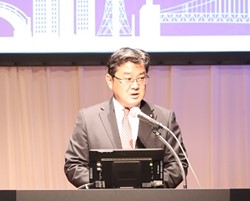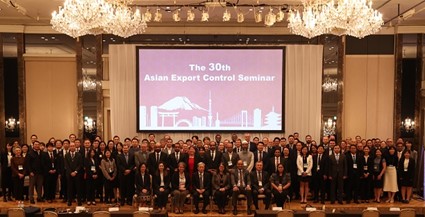- Home
- News Releases
- Back Issues
- February FY2024
- The 30th Asian Export Control Seminar was Held
The 30th Asian Export Control Seminar was Held
February 22, 2024
The 30th Asian Export Control Seminar was held from February 20 to 22, 2024, by the Center for Information on Security Trade Control (CISTEC) as an organizer jointly with the Ministry of Economy, Trade and Industry (METI) and the Ministry of Foreign Affairs (MOFA) as co-organizers. The seminar brought together approximately 180 participants from 34 countries and regions, as well as international and other organizations.
1. Background and Overview
The Asian Export Control Seminar has been held since 1993 in Tokyo to contribute to the prevention of the proliferation of weapons of mass destruction (WMDs) and their means of delivery, and the destabilized accumulation of conventional weapons, through supporting the introduction of strategic trade control systems across Asian countries/regions and reinforcing the implementation thereof. The seminar aims to foster common recognition of the importance of strategic trade control by allowing experts, including those from governmental organizations of countries/regions in Asia and throughout the world as well as from international and other organizations, to meet together, exchange opinions, and share information on the latest international situation and best practices regarding strategic trade control.
2. Outline
(1) Participants
The seminar received about 180 participants from 34 countries and regions, including those from Asia, the United States, and Europe, as well as from international and other organizations.
(2) Main Contents
Opening Remarks
Parliamentary Vice-Minister of Economy, Trade and Industry YOSHIDA Nobuhiro delivered the opening remarks. He described an overview of the situation how the international security environment is hitting a turning point, as evident from the serious state of global affairs, including Russia’s invasion of Ukraine and repeated ballistic missile launches by North Korea. He pointed out the increasing importance of strategic trade control to respond to such environmental changes. He also stressed the importance of international cooperation for the effective implementation of strategic trade control, and that this seminar provides a valuable opportunity for networking, exchanging information, and sharing best practices among experts. He stated that Asia undertakes the core of the global supply chain as the hub for the production and distribution of goods and technologies that may cause a security risk, and affirmed that each Asian country’s/region’s continuous actions are important which promote the introduction of strategic trade control systems to improve implementation in order to assure not only the security of Asia but also the global security as a whole.
Panel Discussion: Current Security Risks
The discussion affirmed the increasing importance of international and interagency cooperation among the strategic trade control authorities, and dialogues between regulatory authorities and exporters to counter the current security risks, in particular, illicit procurement or intangible technology transfer, and proliferation financing that could facilitate the proliferation of WMDs or terrorism.
Presentation from Asian Countries
Representatives of the Philippines, Cambodia, China, Lao PDR, Malaysia, Singapore, Bangladesh, Thailand, Pakistan, Hong Kong, and Indonesia explained their progress and ongoing efforts to introduce or strengthen their strategic trade control systems.
Presentation by Expert
A study on the analysis of the economic benefit of introducing a strategic trade control system demonstrated that the introduction of export control systems results in an increase in the trade value of almost all items on the HS codes basis and that the introduction of export control systems signals the country’s commitment to the improvement of its trade and investment environment, adding a positive effect on inward direct investment.
Thematic Session - Outreach to Academia -
Presentations were delivered on case studies to introduce specific illegal cases and outreach activity efforts by governmental organizations focusing on intangible technology transfer (ITT) in universities and research institutes. Discussion progressed to mention the importance of deepening researchers' understanding of strategic trade control, and also the necessity to work on practical issues upon accepting researchers and students from abroad to stay for a short period of time.
Presentations by the United Nations, and Other International Organizations
Representatives of the UN Security Council 1540 Committee, the UN Security Council Sanctions Committee on North Korea, the Hague Code of Conduct against Ballistic Missile Proliferation (HCOC), and the Organisation for the Prohibition of Chemical Weapons (OPCW) explained the latest efforts being tackled by the respective organizations.
A representative from a multilateral export control regime also explained the latest efforts based on technological developments.
Thematic Session - Best Practices in Implementation
Representatives of Canada, the Republic of Korea, the Netherlands, Switzerland, the United Arab Emirates, Japan, and the United States introduced best practices regarding catch-all control, transshipment control, and brokering control, and efforts for promoting the formulation of internal compliance programs (ICPs) by exporters.
(3) Outcome
The 30th seminar brought together approximately 180 participants involved in export control from 34 countries and regions, including those from Asia, the United States, and Europe, as well as international and other organizations. The participants actively exchanged opinions regarding the shared challenges and their relevant efforts in each country, and the best practices for the effective implementation of strategic trade control. The seminar also helped strengthen the network among Asian countries and regions and participants.METI will continue to make efforts to encourage Asian countries and regions to establish strategic trade control systems and enhance the effectiveness of existing systems through its outreach activities, including the Asian Export Control Seminar.
3. Participating Countries, Regions, and Organizations
(1) Asia (19 countries and regions)
Bangladesh, Cambodia, China, Taiwan, Hong Kong, India, Indonesia, Japan, Kazakhstan, Lao PDR, Malaysia, Mongolia, Pakistan, the Philippines, the Republic of Korea, Singapore, Sri Lanka, Thailand, and Viet Nam(2) Outside of Asia (15 countries and regions)
Australia, Canada, Czech Republic, Ecuador, the European Union, Finland, Germany, Greece, Latvia, the Netherlands, Norway, Switzerland, the United Arab Emirates, the United Kingdom, and the United States(3) International and Other Organizations
The United Nations Security Council Committee established pursuant to Resolution 1718, the 1540 Committee Group of Experts, the Hague Code of Conduct against Ballistic Missile Proliferation (HCOC), the Organisation for the Prohibition of Chemical Weapons (OPCW), the Multilateral Export Control Regimes (the Nuclear Suppliers Group [NSG], the Australia Group [AG], the Missile Technology Control Regime [MTCR], the Wassenaar Arrangement [WA])

